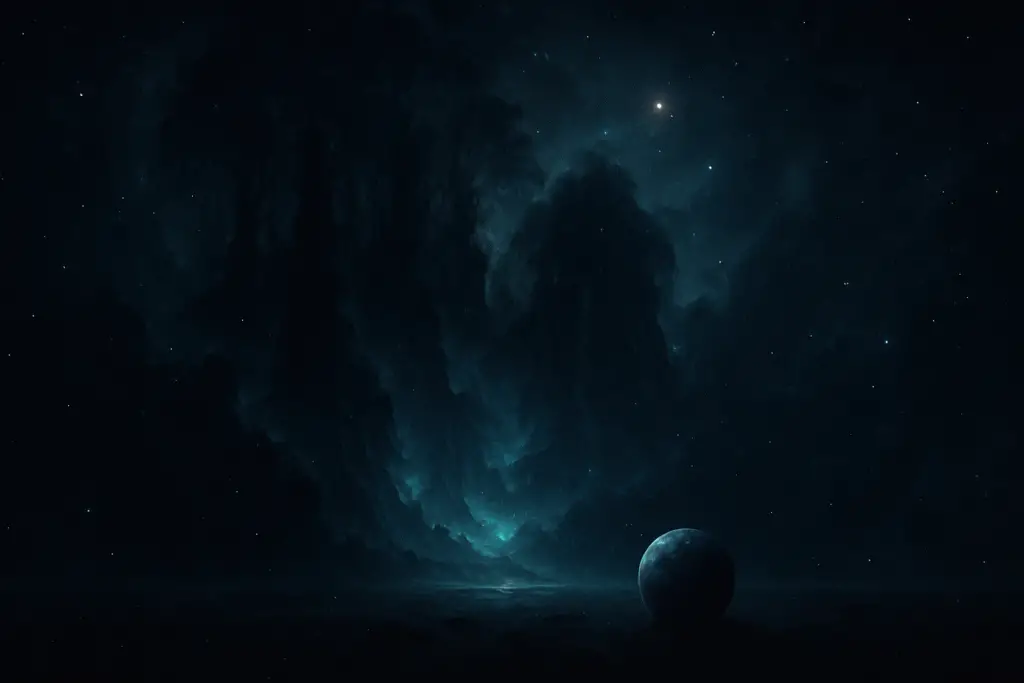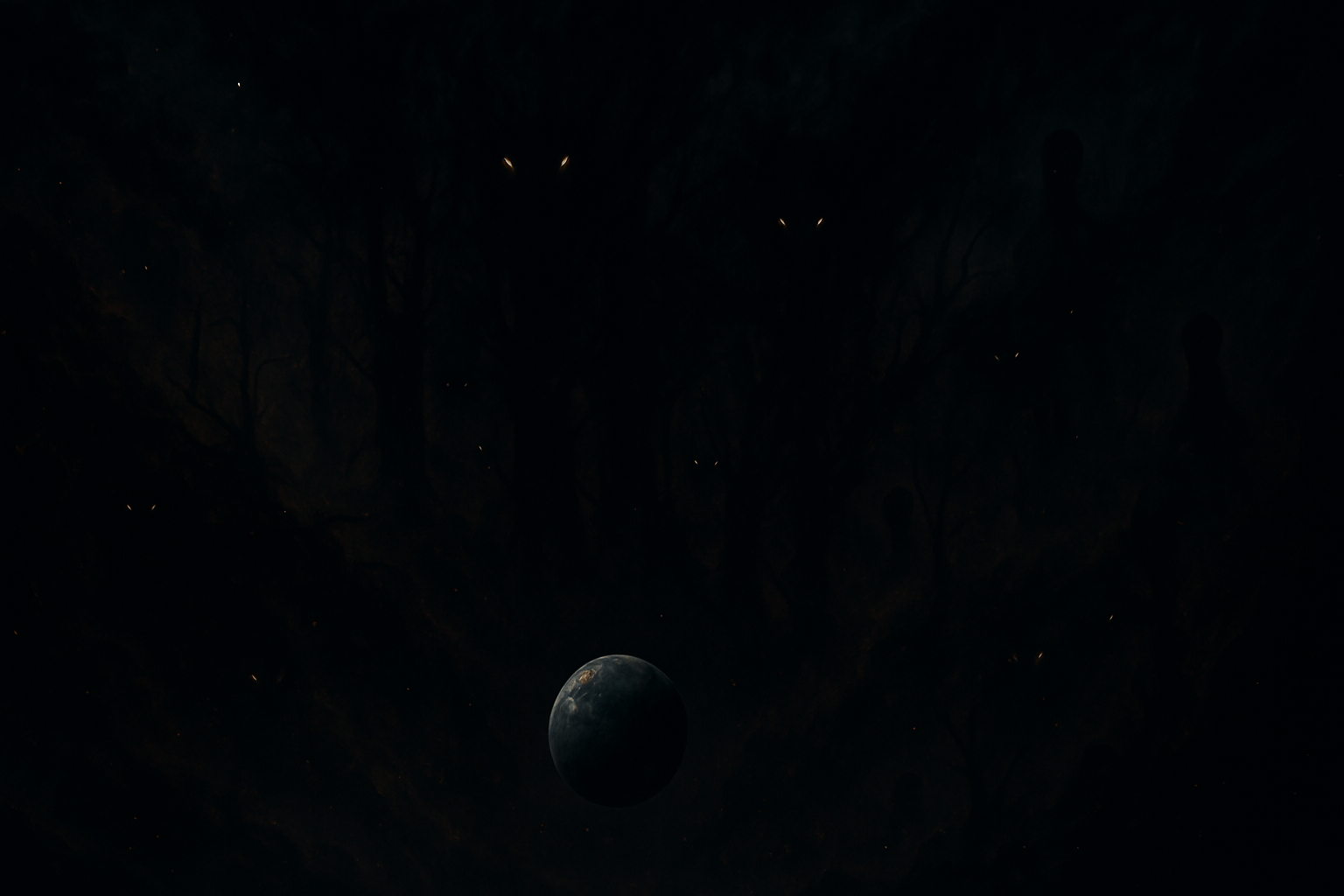The Fermi Paradox asks: if the universe is full of stars and planets, why haven’t we found aliens? Explore the top theories behind this cosmic mystery.
What Is the Fermi Paradox?
The Fermi Paradox is a fascinating and somewhat unsettling question that has puzzled scientists, philosophers, and science fiction fans for decades. At its heart, it highlights a stark contradiction. On one hand, the universe is unimaginably vast, with billions of stars in our Milky Way galaxy alone, and countless more galaxies beyond. Many of these stars likely host Earth-like planets. Given these numbers, the probability of extraterrestrial life existing, and even developing intelligence, seems quite high.
However, despite this high probability, we have found no conclusive evidence of alien civilizations. There are no confirmed signals, no unambiguous artifacts, and no verified visits. This profound silence, this apparent emptiness in a universe that should be teeming with life, is the core of the Fermi Paradox.
A Simple Question with Deep Implications
The question was famously posed by physicist Enrico Fermi during a casual lunchtime conversation in 1950. While discussing UFO reports and the possibility of interstellar travel with colleagues, Fermi reportedly blurted out, “But where is everybody?”. This simple question encapsulated the paradox: if advanced alien civilizations are common, why haven’t we seen any sign of them?
This isn’t just a casual musing; it touches upon fundamental questions about our place in the cosmos, the nature of life, and the future of humanity. The lack of contact forces us to consider a range of possibilities, from the encouraging to the deeply disturbing.
Fermi Paradox Explained Simply
So, what exactly is the big deal with the Fermi Paradox? Imagine you’re at a massive, bustling party. You know there are hundreds of guests, music is playing, and conversations are happening all around. Yet, for some reason, you can’t see or hear anyone else. It’s just you, in a seemingly empty room that should be full of activity. That’s a bit like the Fermi Paradox, but on a cosmic scale. This is the Fermi Paradox explained simply, a concept that questions our solitude.
The Cosmic Numbers Game
Let’s break it down. Our galaxy, the Milky Way, has hundreds of billions of stars. Many of these stars are similar to our Sun. Scientists believe a significant number of these sun-like stars could have planets orbiting them in the “habitable zone” – an area where conditions might be right for liquid water, a key ingredient for life as we know it. The question of “where are the aliens” becomes more pressing with these numbers.
The Timeline Advantage of Alien Civilizations
Now, consider that many of these stars and their potential life-harboring planets are much, much older than our solar system. If life can arise and evolve into intelligent civilizations, it stands to reason that some alien civilizations would have had a huge head start on us – millions, or even billions, of years. Understanding the Fermi Paradox in simple terms helps grasp this timeline.
The Deafening Silence
With that kind of time, you’d expect at least some of these advanced civilizations to develop technologies like interstellar travel or powerful communication systems. Even if they traveled at a fraction of the speed of light, they could have explored or colonized large parts of the galaxy by now. We should, theoretically, see some evidence of their existence – radio signals, giant structures, or even probes visiting our solar system. The Fermi Paradox simplified highlights this expectation.
But we don’t. The universe appears remarkably quiet. That’s the paradox: the high likelihood of alien life existing versus the complete lack of concrete evidence. “Where are the aliens?” isn’t just a curious question; it’s a profound puzzle that challenges our understanding of life, intelligence, and our place in the vast cosmos. The Fermi Paradox, in simple terms, is this deafening silence from a universe that we expect to be noisy with life.
Major Theories: The Great Filter and the Dark Forest

When trying to understand why the universe is so quiet, scientists and thinkers have proposed many fascinating, and sometimes unsettling, theories. Two of the most prominent and thought-provoking explanations for the Fermi Paradox are the Great Filter hypothesis and the Dark Forest hypothesis. These ideas offer different perspectives on why we might not be seeing any signs of alien civilizations.
The Great Filter: A Cosmic Hurdle for Life
The Great Filter theory suggests that there is some kind of incredibly difficult step or barrier in the development of life that most, if not all, potential life forms fail to overcome. This “filter” could be anything from the initial spark of life itself to the development of intelligence, or even a challenge that advanced civilizations face much later on. The concept of the Fermi Paradox and Great Filter are thus deeply intertwined.
Possibility 1: The Filter Is Behind Us
There are two main ways to think about the Great Filter. First, the filter could be behind us. This would mean that one of the steps life on Earth has already passed – like the jump from single-celled organisms to complex life, or the development of intelligence – is extraordinarily rare. If this is the case, then humanity might be one of the very few, or even the only, species to have made it through. This is a somewhat optimistic view for our future, as it implies we’ve already passed the biggest hurdle.
Possibility 2: The Filter Is Ahead of Us
Alternatively, the Great Filter could be ahead of us. This is a more sobering thought. It suggests that there’s a common challenge that most, or all, advanced civilizations eventually face and fail to survive. This could be self-destruction through nuclear war, catastrophic environmental damage, runaway artificial intelligence, or some other unforeseen existential threat. If the Great Filter is in our future, then the silence of the universe could be a warning sign.
What It Means for Us
The Fermi Paradox vs Great Filter debate is crucial because it forces us to consider our own trajectory as a species. Are we special because we passed a rare filter, or are we simply approaching a common doom?
The Dark Forest: A Universe of Silent Hunters
A more chilling explanation, popularized by Liu Cixin’s science fiction novel “The Three-Body Problem,” is the Dark Forest hypothesis. This theory paints the universe not as an empty space waiting to be filled with friendly chatter, but as a dangerous, dark forest where every civilization is a silent hunter, and revealing your location is a potentially fatal mistake. The Fermi Paradox and Dark Forest connection offers a stark perspective.
 Buy Liu Cixin’s Masterpiece on eBay
Buy Liu Cixin’s Masterpiece on eBay
Fear as a Survival Strategy
Imagine a dark forest at night. Every rustle of leaves could be a predator. The safest strategy for any creature is to stay hidden and quiet. If you call out, you might attract the attention of something much larger and more dangerous than yourself. The Dark Forest theory applies this logic to cosmic civilizations, a key idea in sci-fi explorations of the Fermi Paradox.
Paranoia on a Galactic Scale
According to this idea, any emerging civilization quickly realizes that other civilizations could be hostile or expansionist. Since you can never be sure of another civilization’s intentions, and the stakes (survival) are so high, the most rational behavior is to remain silent and, if necessary, eliminate any other civilization that reveals itself before it can become a threat. This creates a universe where everyone is listening, but no one is transmitting.
The Fermi Paradox and Dark Forest connection is a popular one in sci-fi because it offers a dramatic and suspenseful reason for the cosmic silence. It suggests that aliens might be out there, but they are deliberately hiding, not because they are shy, but because they are terrified – or terrifying.
Possible Solutions to the Fermi Paradox
Beyond the Great Filter and the Dark Forest, a multitude of other theories attempt to explain why we haven’t found any aliens. These Fermi Paradox theories range from the practical to the profoundly strange, each offering a different lens through which to view the cosmic silence. Exploring these Fermi Paradox solutions is key to understanding the debate.
The Zoo Hypothesis: We’re Being Watched
One well-known idea is the Zoo Hypothesis. This theory suggests that advanced extraterrestrial civilizations are aware of us but choose not to make contact. They might be observing humanity like we observe animals in a zoo or a nature preserve, allowing us to develop naturally without interference. Perhaps they have a “prime directive” not to meddle with less advanced cultures. The Zoo Hypothesis is one of the more intriguing Fermi Paradox theories.
The Self-Destruction Hypothesis: We All Implode
Another, more pessimistic, explanation is the Self-Destruction Hypothesis. This posits that intelligent civilizations, once they reach a certain level of technological advancement, inevitably destroy themselves. This could be through nuclear war, environmental collapse, uncontrolled artificial intelligence, or other existential risks. If this is common, then civilizations might simply not last long enough to make widespread interstellar contact. Self-destruction is a grim, but plausible, Fermi Paradox solution.
The Rare Earth Hypothesis: We’re Unique
The Rare Earth Hypothesis offers a different perspective. It argues that while simple life might be common in the universe, the specific conditions required for complex, intelligent life like ours to evolve are incredibly rare. Earth might be a cosmic anomaly, with a unique combination of factors (a large moon, plate tectonics, a stable orbit, a protective magnetic field, etc.) that are not easily replicated elsewhere. If so, we might be one of very few, or even the only, intelligent species.
Too Alien to Recognize
It’s also possible that they are too alien for us to recognize. Their biology, communication methods, or even their very concept of existence might be so different from ours that we wouldn’t identify their signals or presence even if we encountered them. They could be communicating in ways we haven’t conceived of, or their technology might be indistinguishable from natural phenomena to our current understanding.
We’re Not Looking Right
Some argue that they exist but are too far away, or we simply haven’t looked long enough or in the right places. The universe is vast, and our search for extraterrestrial intelligence (SETI) has only been active for a few decades, scanning a tiny fraction of the cosmic haystack. They might be out there, but their signals haven’t reached us yet, or we haven’t pointed our instruments in the right direction at the right time. This is one of the more straightforward Fermi Paradox solutions.
Maybe We Really Are Alone
Finally, there’s the straightforward, if lonely, possibility that we are truly alone, or at least among the very first intelligent civilizations to arise in our galaxy. While statistically challenging given the size of the universe, it remains a potential solution to the Fermi Paradox. Each of these Fermi Paradox solutions offers a unique answer to the question, “Where are the aliens?”, but for now, the silence persists.
Cultural Impact: Sci-Fi, Games, and Pop Culture
The Fermi Paradox isn’t just a topic for scientific debate; it has deeply permeated our culture, especially in the realms of sci-fi, video games, and popular discussions about the cosmos. Its central question, “Where is everybody?”, is so compelling that it has inspired countless stories and imaginative scenarios, shaping how we think about alien life and our own future.
How the Fermi Paradox Shaped Sci-Fi and Pop Culture
Science fiction literature and film have explored the paradox extensively. Many narratives use it as a jumping-off point to create universes where the silence is explained by various theories. For instance, Arthur C. Clarke’s “2001: A Space Odyssey” hints at ancient, advanced aliens who leave behind monoliths, suggesting a form of observation or guidance (akin to a Zoo Hypothesis variant). The “Star Trek” universe often features a Prime Directive, forbidding interference with less developed civilizations, another nod to potential reasons for alien silence.
More recently, as mentioned, Liu Cixin’s “The Three-Body Problem” series brought the Dark Forest theory into the mainstream, offering a terrifying explanation for the lack of contact. This has resonated strongly with modern audiences, reflecting contemporary anxieties. Other sci-fi works explore themes of civilizations that have self-destructed, or filters that prevent widespread interstellar societies.
Gaming the Paradox: How Video Games Explore Alien Silence
The Fermi Paradox game genre, though not a formal category, includes many titles where players confront the implications of the paradox. Strategy games like “Stellaris” allow players to encounter various types of alien civilizations, some of which might be remnants of past empires or entities that choose to remain hidden. Survival horror games sometimes tap into the fear of the unknown that the paradox evokes, imagining hostile first contacts or the discovery of civilizations that fell victim to some cosmic threat. The presence of a Fermi Paradox game or related media shows its broad appeal.
From Forums to YouTube: The Paradox Goes Viral
Beyond specific works, the paradox fuels online discussions, YouTube explainer videos, and podcasts, engaging a broad public curious about humanity’s place in the universe. It serves as a constant reminder of the vastness of space and the profound mystery of whether we are alone or part of a much larger, quieter cosmic community. The cultural impact of the Fermi Paradox underscores our innate desire to understand our origins and our potential destiny among the stars.
Conclusion: Are We Truly Alone?
🔭 The Echo of Silence
The Fermi Paradox remains one of the most profound and unanswered questions in science. Despite the sheer scale of the universe and the statistical likelihood of other intelligent life, we are met with an unnerving silence. “Where are all the aliens?” is a question that echoes through our observatories and our imaginations, prompting a wide array of theories—from the hopeful to the deeply concerning.
🧠 Revisiting the Leading Theories
We’ve explored several potential Fermi Paradox solutions. Perhaps a Great Filter makes the leap to advanced, space-faring civilization incredibly rare, and we are either uniquely fortunate to have passed it—or perilously close to facing it. Maybe the universe is a Dark Forest, where silence is the best survival strategy. Or perhaps we are living inside a cosmic Zoo, observed but deliberately avoided. The possibilities are as vast as the cosmos itself when considering Fermi Paradox theories.
🌍 What It Means for Humanity
Each theory carries significant implications for us. If we are truly alone—or among the very first—it places a tremendous responsibility on our shoulders as the (current) sole bearers of cosmic consciousness. If civilizations commonly self-destruct, it serves as a stark warning for our own future. And if the universe is dangerous, perhaps we should reconsider our eagerness to broadcast our presence. The way we interpret the silence could shape how we behave as a species.
🚀 The Ongoing Search
The search for extraterrestrial intelligence (SETI) continues, and with each technological advancement, our ability to scan the cosmos improves. New telescopes, exoplanet discoveries, and AI-driven analysis bring us closer to potential answers. Whether we eventually find evidence of other civilizations or confirm our solitude, the quest itself forces us to confront fundamental questions about life, intelligence, and our role in the universe.
❓ A Question That Defines Us
So, if the universe is indeed a silent expanse—or perhaps a dark forest—what should our next move be? Should humanity be cautiously listening, hiding in the shadows until we better understand what’s out there? Or should we be boldly reaching out, defying the silence with hope and curiosity?
The answer remains elusive, a mystery woven into the very fabric of the stars. But one thing is certain: the search for meaning beyond Earth isn’t just about aliens—it’s about understanding who we are, where we’re going, and what kind of civilization we hope to become.
Maybe you also like:
Follow me on:
For more updates, visit: flashpointnews.com.br


